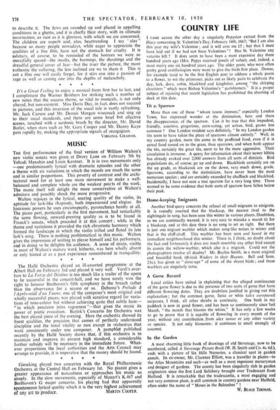MUSIC THE first performance of the final version of William
Walton's new violin sonata was given at Drury Lane on February 5th by Yehudi Menuhin and Louis Kentner. It is in two movements only —one predominantly lyrical with dramatic episodes and the other a theme with six variations in which the moods are much the same and in similar proportions. This poverty of contrast and the archi- tectural need for at least one more movement to make a well- balanced and complete whole are the weakest poirts of the work. The music itself will delight the more conservative of Walton's admirers and possibly shock the more progressive. Walton rejoices in the lyrical, soaring quality of the violin, its aptitude for lark-like rhapsody, both impassioned and elegiac. Its histrionic powers he uses circumspectly, pyrotechnics hardly at all. The piano part, particularly in the first movement, had remarkably the same flowing, onward-pressing quality as is to be found in Franck's sonata, which preceded it at this concert ; while in the theme and variations it provided the rich chromatic harmony which formed the landscape in which the violin trilled and fluted its late lark's song. There is nothing problematical in this music. Walton gives the impression of writing to please himself and his performers, and in doing co he delights his audience. A sense of strain, visible in most of Walton's mature work hitherto, was here wholly absent or only hinted at as a past experience remembered in tranquillity.
* * * *
The Halle Orchestra played an ill-assorted programme at the Albert Hall on February 3rd and played it very well. Verdi's over- ture to La Forza del Destino is too much like a trailer of the opera to be successful in the concert-hall, and we have surely won the right to honour Beethoven's fifth symphony in the breach rather than the observance for a season or so. Debussy's Prelude a !'Ayres midi d'un Faune, one of the composer's most original and wholly successful pieces, was played with sensitive regard for varia- tions of tone-colour but without achieving quite that subtle haze- " in which precision joins vagueness "—that gives the music its power of poetic evocation. Bartok's Concerto for Orchestra was the best played piece of the evening. Here the orchestra showed its finest qualities, the precision that comes of perfectly understood discipline and the tonal vitality so rare except in orchestras that work consistently under one composer. A pamphlet published recently by the Halle Society shows that, if this orchestra is to maintain and improve its present high standard, a considerable further subsidy will be necessary in the immediate future. What- ever proportions the local authorities and the Arts Council may arrange to provide, it is imperative that the money should be found.
* * * Gieseking played two concertos with the Royal Philharmonic Orchestra at the Central Hall on February 1st. No pianist gives a greater appearance of naturalness or approaches his music so simply. In the slow movements, especially of Mozart's K.467 and Beethoven's G major concerto, his playing had that apparently spontaneous lyrical quality which it is the very highest achievement


































 Previous page
Previous page